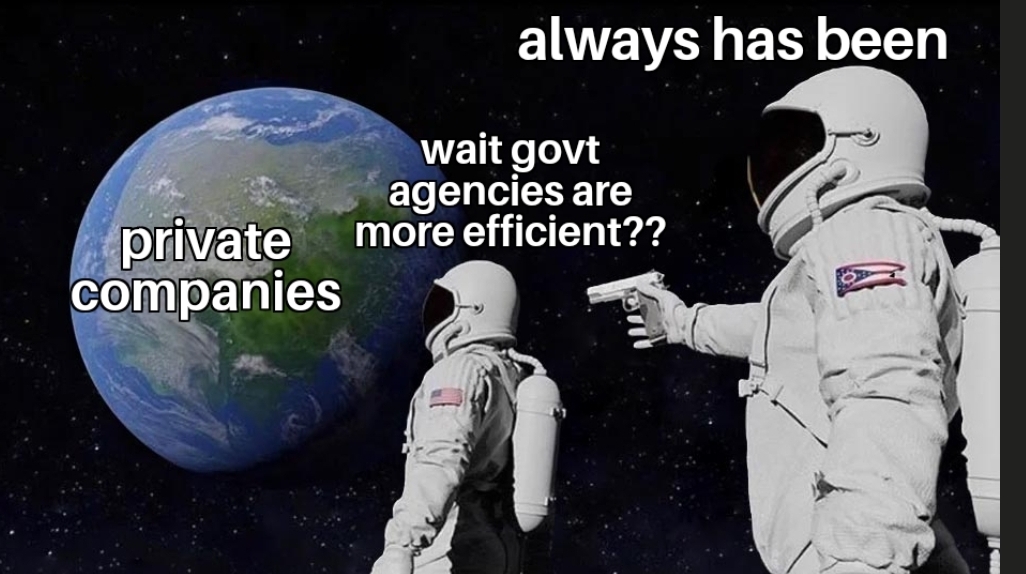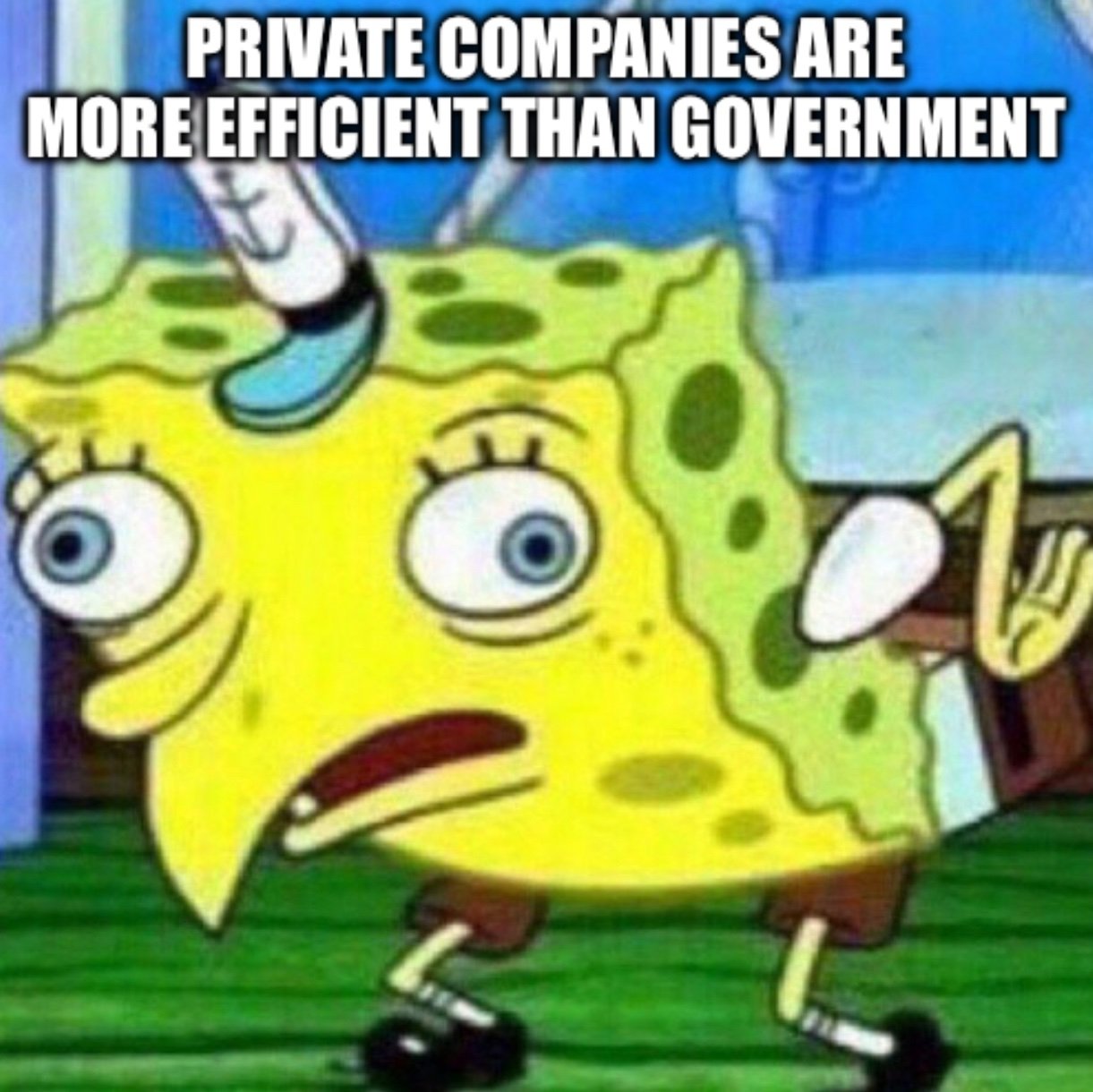
Memes
Rules:
- Be civil and nice.
- Try not to excessively repost, as a rule of thumb, wait at least 2 months to do it if you have to.
Ya know what was a foundational part of the American dream? Pensions. Ya know which employers still offer them? Counties, states and the federal government.
Private companies exist solely to make the people at the top very rich based on the stolen value of employee labor while dumping catastrophic losses in the public sphere. That's capitalism in a nutshell.
You'd have to be unbelievably gullible, naive, traumatized AND brainwashed to be a diehard for a system like that. But, somehow they've managed it. A deluded nation of Amway top performers just one move away from making their own imaginary millions. All simping for the system.
Yesterday an American accidentally admitted that they tip their landlord. It was at that point I said to myself "man you fuckers deserve to suffer under whatever republican you end up voting for next election because we all know that's what you dumb ass motherfuckers are going to do"
You wanna know something else? The majority of the world economy is already centrally planned. Not on the national level, on the corporate level. Business is dominated by a relatively few giant corporations with internal economies the size of some nations. None of them run free markets internally. Sears experimented with it, to their demise. Central planning is already the primary way that our economic lives are driven. It's just we let unaccountable billionaires do the planning instead of an elected body.
My government is mostly privatized. We even hired a consulting firm to figure out how the government could lower consulting fees. The consultants found that if we consult less, we will have lower consulting fees. We paid over half a million for that single report:
https://www.theglobeandmail.com/politics/article-federal-government-kpmg-consulting/
Australia is a live example of the fact that they're not. The state and federal governments have privatised a crap load of services and all they do is continue to hike our bills while providing less and less service. Electricity, water supply, employment services and more are now an absolute joke here.
Yep because what's more important than efficient, cost effective services? Spoiler, it's profit.
Only someone who has never worked for a large corporation could hold the belief that corporations are efficient at making their product.
They're very efficient at funneling money to their executives and owners though.
My mom mockingly said once "do you want your doctor visits to be just like the DMV?"
Nope, I want my doctor visits to be more like the USPS. Compare their numbers to UPS or any of the others and it's night and day.
I remember in college we took a course on economic efficiency and the short takeaway is "the free market is extremely efficient, but only when the competing parties start with equal resources. the more inequal the starting position, the less efficient the market becomes." and to my mind that suggests that we should enforce some sort of "rubber-banding" effect so that a company needs to keep competing or else it will "drift" back to the mean over time. Something like aggressive taxes on the uber-rich and comprehensive welfare for the poor, y'know? Capitalism but with safety guards would be pretty cool.
Something like aggressive taxes on the uber-rich and comprehensive welfare for the poor, y’know?
This is why aggressive estate taxes are so incredibly critical. People shouldn't be professional descendants. And of course welfare provides both ladder and safety net. The fools who are trying to abolish one or both are working against social mobility.
I mean, they are (at making profit), but funnily enough, you can't run a society when everything is profit driven 🙄
Private companies are why Flint still has lead water pipes, and why Texas doesn't have a working power grid, and why you and I are facing a 30%-50% increase in our cost of living.
There needs to be MORE regulation. Not less.
Having worked for both, I would say that most government offices are eternal, whereas private companies can vanish quickly. Sometimes without warning. Its really hard to kill a government office.
Makes me wonder, how did a necessary office survive during a junta or an overthrow? For example, how did the office of a postal clerk change from 1925 to 1955 in, say, Berlin? How does the average Salvadoran DMV worker view the changes in El Salvador since 1980?
How was a tax office run in ancient Babylon versus a modern one today?
I bet there's some weird insights into human civilization to be found in those stories.
My understanding is that the more removed you are from the "top" of the government pyramid, the less you are affected by disruptions of that position. Largely when a new face or party takes over (by force or otherwise) very seldom do they want to rebuild everything from the ground up and will keep most of the bipartisan offices untouched.
If a very violent coup is successful and they're planning punishments for all "government officials" the postman in a rural village is going to be pretty low on that list.
Anyone who worked in both private and public would know both are not more efficient than the other.
Public services are chronically underfunded because of corruption. Private companies perform rabbit in a hat trick by making you guess what undisclosed ingredients they put in your food if they're not regulated, just so to save cost and make money for themselves!
If these last few years have taught us anything.
They are putting undisclosed ingredients into the food even if they are regulated.
They're efficient at maximizing profits for shareholders, usually at the dire expense of literally everyone else.
One point here: the government doesn't pay out a large chunk of it's earnings to people who did nothing to ensure that the product or service was delivered.
They got paid a large percentage of revenue because they're shareholders.
Tell me again why taking a big pile of money from customers, who are very likely not wealthy (at least for the majority), and giving it to wealthy people, is "more efficient" than the government doing the same job and just, not doing that?
If you cut out the profit, the "business" runs more lean, no matter which way you arrange the numbers. I would argue that a more lean business model is simply more efficient. The dollars going in simply result in more output per dollar. IMO, that's efficient.
Am I taking crazy pills here?
I think a big issue is that the government takes a decades long view. This is great because they can plan how to effectively manage our water and other large scale projects with longevity in mind.
Meanwhile, our corporate CEOs take a quarter of a year view. They'd burn the company to the ground as long as it happens after they are stepping down and makes them look good beforehand.
Ignorant AF.
They are better at maximizing profits at the expense of the employees, benefits, wages, local taxes and infrastructure. They work for the shareholders. They shovel money to the top few percent of the company. That’s what we call “efficiency”.
The government does not profit. They government pays standard government wages along with union wages and benefits. They maintain infrastructure. They are only as efficient as contracts allow.
Corporations do not have the same goals as government. One seeks to extract maximum profits for the few at the expense of the many, the other seeks to return to the many as much as is feasible in societal good - schools, roads, power, water, etc. at no profit.

If I had my way I'd make as many services public as possible. I cant stand tge fact that I pay taxes and the "public" transportation (train/bus/subway) isn't free. Imagine how much pocket change you would have if energy companies, telecoms (cell/wifi), and transportation were all gov-run? All that said I have no idea how that would translate in practice, its a nice little daydream I had.
I always thought my city's bus system would be more efficient if they didn't have to bother with charging everyone $1.50 for a ticket when they board.
In fact, they did have free fare this summer in an effort to improve the air quality. Ridership was much higher, and the driver didn't have to mess with the finicky cash machine at every stop.
Most of the people who take the bus here are poor and/or disabled, anyway. I'd love it if they could do away with fares, but I know they're doing the best they can with their limited funding.
My bus ride to work shortened by 10 minutes after getting rid of fares. It mostly serviced a poorer area of town to the downtown hub. Notable stops are a grocery store and the public library where 10-15 people swaps would occur.
Fare free is a great move towards equity too.
I'm a private sector worker slacking off and shitposting on reddit/lemmy all day....
We are DEFINITELY NOT more efficient than the public sector
Possibly, but they have different incentives.
Private companies literally paid billions of dollar to dismantle a (more or less) effective government just so that they could say this (and its still wrong).
In my (Australian) public service career I have watched a team of 100 public servants deliver and keep updated a data capture and processing system
A large American service company now does that job with four times the people. It took years to get them to add keyboard shortcuts to their product - the original was entirely mouse driven; and their product didn't meet contrast rules for months
People: "Government should be run like a business"
Government: "Speed enforcement is now done by a private business. You're welcome."
People: "They're now trying to squeeze every less cent out of us with speed enforcement!"
Business: "Efficiency!"
They're more efficient at getting money from the state and paying it out as bonuses or dividends
In Germany we are in the process of privatizing hospitals. This will surely go over great in case of you know another pandemic. You can bet your butt that a private company will cut staff numbers, they will reduce the number of hospital beds and they will do the least amount of work they can get away with.
I can't easily go to a competitor, now can I? We only have that one hospital in the city.
Oof. As an American, my heart goes out to you. I wouldn't wish our healthcare system on anyone.
Since companies usually have an autocratic structure, i guess they are.
Note: more efficient doesn't mean better for the people or better at all. It just means that they skip a few important steps.
But surely you must admit that they do extract more wealth from the working classes for people who just move money around. Let's see your profit-less crown corporation do that. Checkmate /s
Famously, the blue guys in Australia, defund our public infrastructure, go 'oh no, broken now, have to sell, only private peeps can run this / it will run better / for everyone's best interests' (simultaneously pats themselves on the back for bringing money in, even though that thing they broke, brought money in, until they broke it) also, spoiler, they sell the things to thier mates.
I think the issue is large organizations are inefficient and inflexible, be they government or corporates.
You want small lean groups with a lot of autonomy.
Depends on the situation I'd say.
Private companies are efficient at making oligarchs richer and everybody else poorer.
Neither is obviously more efficient than the other overall, it depends on the structure and the incentives. People worry about private prisons for example. If you make it so the government sends people to prisons and you pay the prison a fixed rate per prisoner, of course you're gonna get skimping on services by the prisons. If you instead give the prisoner a voucher for a prison and make them pick where they go and prisons get money per voucher they get from prisoners, you're gonna get competition on quality so you'll get high quality prisons. Opposite outcomes with just a change to incentives.
